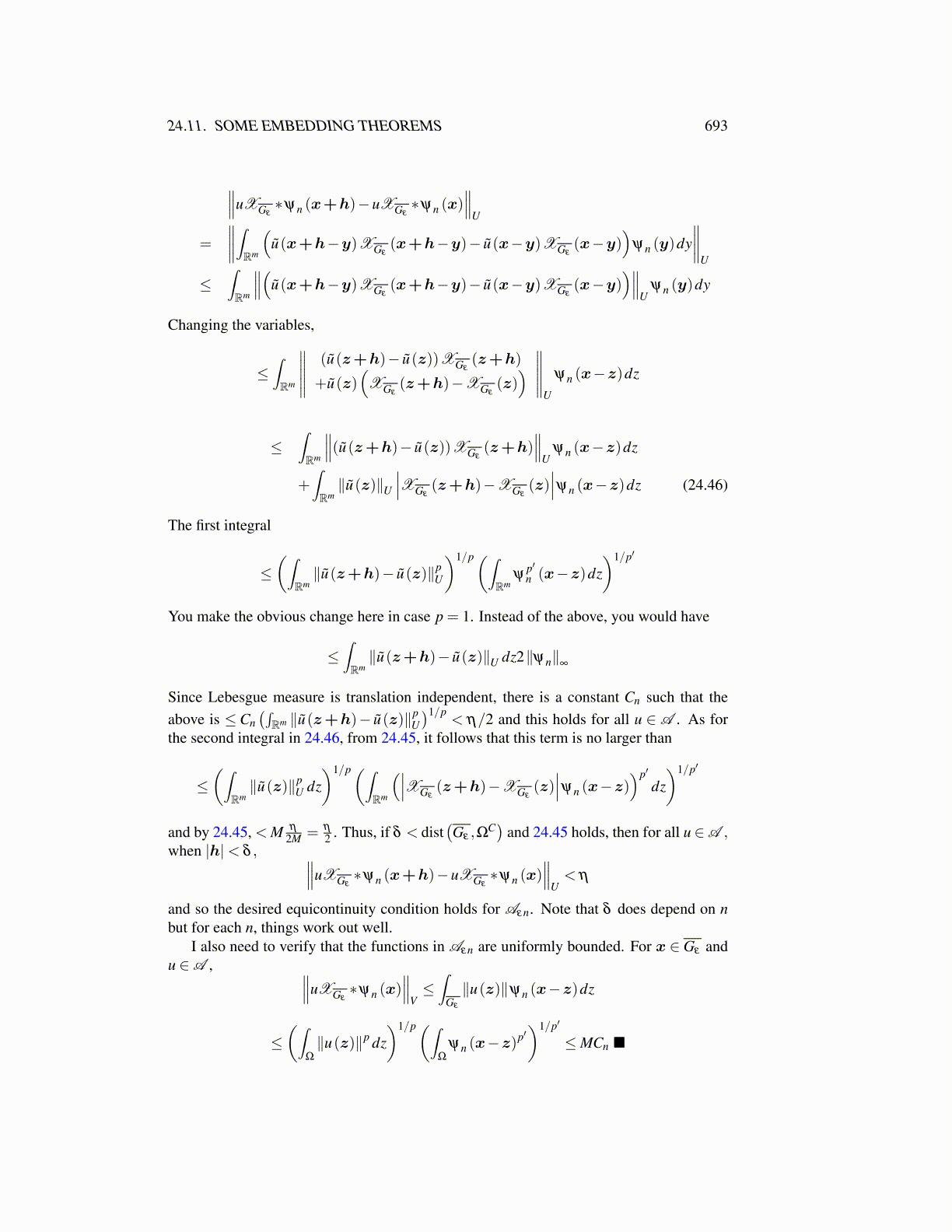
24.11. SOME EMBEDDING THEOREMS 693
∥∥∥uXGε∗ψn (x+h)−uXGε
∗ψn (x)∥∥∥
U
=
∥∥∥∥∫Rm
(ũ(x+h−y)XGε
(x+h−y)− ũ(x−y)XGε(x−y)
)ψn (y)dy
∥∥∥∥U
≤∫Rm
∥∥∥(ũ(x+h−y)XGε(x+h−y)− ũ(x−y)XGε
(x−y))∥∥∥
Uψn (y)dy
Changing the variables,
≤∫Rm
∥∥∥∥∥ (ũ(z+h)− ũ(z))XGε(z+h)
+ũ(z)(XGε
(z+h)−XGε(z)) ∥∥∥∥∥
U
ψn (x−z)dz
≤∫Rm
∥∥∥(ũ(z+h)− ũ(z))XGε(z+h)
∥∥∥U
ψn (x−z)dz
+∫Rm∥ũ(z)∥U
∣∣∣XGε(z+h)−XGε
(z)∣∣∣ψn (x−z)dz (24.46)
The first integral
≤(∫
Rm∥ũ(z+h)− ũ(z)∥p
U
)1/p(∫Rm
ψp′n (x−z)dz
)1/p′
You make the obvious change here in case p = 1. Instead of the above, you would have
≤∫Rm∥ũ(z+h)− ũ(z)∥U dz2∥ψn∥∞
Since Lebesgue measure is translation independent, there is a constant Cn such that theabove is ≤ Cn
(∫Rm ∥ũ(z+h)− ũ(z)∥p
U
)1/p< η/2 and this holds for all u ∈ A . As for
the second integral in 24.46, from 24.45, it follows that this term is no larger than
≤(∫
Rm∥ũ(z)∥p
U dz)1/p(∫
Rm
(∣∣∣XGε(z+h)−XGε
(z)∣∣∣ψn (x−z)
)p′
dz)1/p′
and by 24.45, < M η
2M = η
2 . Thus, if δ < dist(Gε ,Ω
C)
and 24.45 holds, then for all u ∈A ,when |h|< δ , ∥∥∥uXGε
∗ψn (x+h)−uXGε∗ψn (x)
∥∥∥U< η
and so the desired equicontinuity condition holds for Aεn. Note that δ does depend on nbut for each n, things work out well.
I also need to verify that the functions in Aεn are uniformly bounded. For x ∈ Gε andu ∈A , ∥∥∥uXGε
∗ψn (x)∥∥∥
V≤∫
Gε
∥u(z)∥ψn (x−z)dz
≤(∫
Ω
∥u(z)∥p dz)1/p(∫
Ω
ψn (x−z)p′)1/p′
≤MCn ■